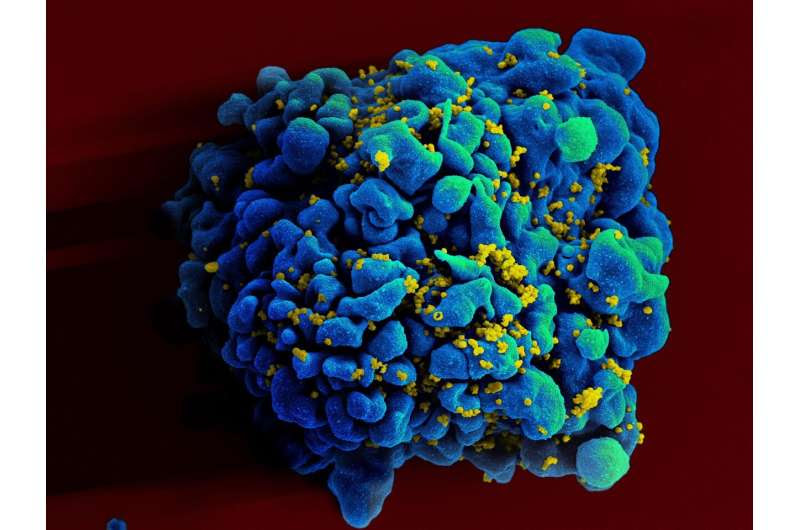by Enrique Rivero, University of California, Los Angeles

HIV infected T-cell. Credit: NIAID
MitoQ, a mitochondrial antioxidant that is available to the public as a diet supplement, was found in a mouse study to reverse the detrimental effects that HIV and antiretroviral therapy (ART) have on mitochondria in the brain, heart, aorta, lungs, kidney and liver.
The researchers used a molecular method to measure the ratio of human and murine mitochondrial (mtDNA) to nuclear DNA (ntDNA) ratio, a measure of mitochondrial dysfunction. Reduction in this ratio reflects mitochondrial dysfunction.
Compared to uninfected mice, HIV infected mice treated with ART had mitochondrial dysfunction in the human immune cells in the brain, heart, liver, lungs, and gut. ART itself also affected mitochondrial function in mouse heart cells. When treated with MitoQ for 90 days, HIV infected mice had reduced mitochondrial dysfunction in organs compared to HIV infected mice on ART.
Mitochondria are the key cell structures that are important for the smooth function of organs such as the brain, heart, liver and kidney. HIV causes a chronic state of inflammation and immune dysfunction that contribute to organ damage organs. The reasons for this are unclear, but it is known that mitochondrial dysfunction contributes to organ damage and is present in chronic HIV. There are no therapies for HIV associated diseases that affect organs such as the brain, heart and liver.
The researchers used humanized mice, which have human immune cells that can be infected with HIV. They infected them with the virus, treated them with ART consisting of tenofovir disoproxil fumarate, emtricitabine, and raltegravir, then fed them MitoQ through drinking water for three months. The control mice were not given MitoQ.
The researchers note that humanized mice do not exactly recreate HIV infection in humans. Also, the infected mice were exposed to both the virus and the ART and they could not dissect the exact contribution of the virus versus the ART to mitochondrial dysfunction in human cells.
These preclinical findings could serve as the foundation for clinical trials in humans with HIV.
“MitoQ is a diet supplement that is known to be safe in humans and is readily available for use,” said senior author Dr. Theodoros Kelesidis, associate professor of medicine in the division of infectious diseases at the David Geffen School of Medicine at UCLA.
“Our findings support clinical trials of MitoQ in people with HIV who take antiretrovirals to determine whether it can be a potential treatment for comorbidities associated with chronic HIV infection. Until then people with HIV should not take this diet supplement for treatment of any conditions associated with HIV infection.”
The study is published in the Journal of Infectious Diseases.

Leave a Reply